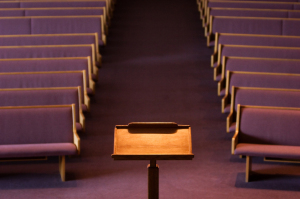Top EU official challenges COVID-19 worship bans in key religious freedom case

A contentious legal challenge on religious freedom, centered on the COVID-19 worship bans during lockdowns, has been launched at the European Court of Human Rights by a leading EU official criticizing the restrictions as “profoundly illiberal and illegitimate.”
Jan Figel, a Slovak politician and former EU Special Envoy for Freedom of Religion or Belief, initiated the challenge, questioning the compatibility of such restrictions with the fundamental right to communal religious practice, the human rights group ADF International said in a statement.
Figel contended that such all-encompassing bans disregard the pivotal role religion plays in the lives of the believer.
“It was evident that religious worship could be conducted safely during the pandemic,” he said. “Bans were unfair and disproportionate. Our arguments submitted to the court demonstrate clearly that blanket bans are violations of religious freedom under international human rights law.”
Throughout the pandemic, several countries, including the U.K. and Slovakia, imposed restrictions on worship services.
In Slovakia, the government justified these broad prohibitions, citing the availability of digital worship alternatives. Figel’s arguments contest this justification, emphasizing that for believers, communal worship and spiritual sustenance can be as critical as physical nourishment.
Dr. Adina Portaru, senior counsel for ADF International, asserted the necessity of protecting fundamental freedoms, especially during a crisis. “The international legal framework is very clear in its protection of this right as it benefits everyone — people of faith as well as people of no faith. Fundamental freedoms apply to all, and in times of crisis they must be protected rather than weakened,” Portaru said.
Figel’s case might be the first where Europe’s top human rights court rules on the blanket bans on public worship during the COVID-19 pandemic, the human rights group said, adding that it could set a precedent across 46 European states.
In the past, the ECHR has upheld the “freedom to manifest one’s religion not only alone and in private but also in community with others, in public and within the circle of those whose faith one shares,” ADF International noted, adding that this point was further emphasized in 2021, when Scotland’s highest civil court ruled that digital options were an alternative, not a replacement, for worship.
Figel, who served as the EU’s religious freedom envoy until 2019, referred to the EU’s responsibility to uphold fundamental freedoms, stating that the bloc couldn’t credibly promote religious freedom worldwide if its member states failed to safeguard these liberties at home.
His challenge is welcomed and supported by a diverse civil society coalition, including academics, artists, politicians and faith leaders.



























